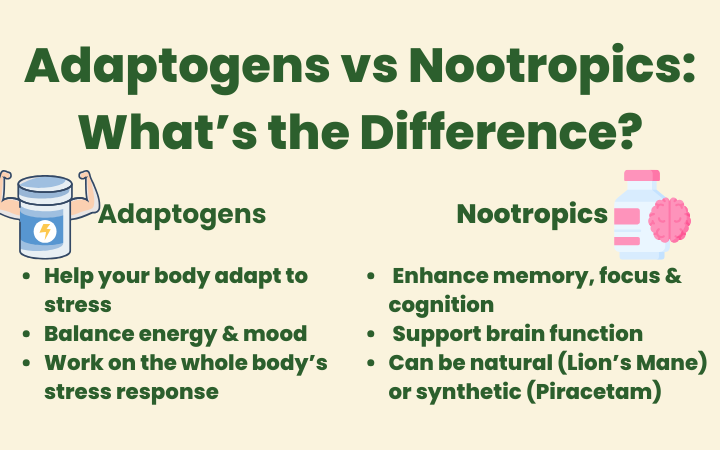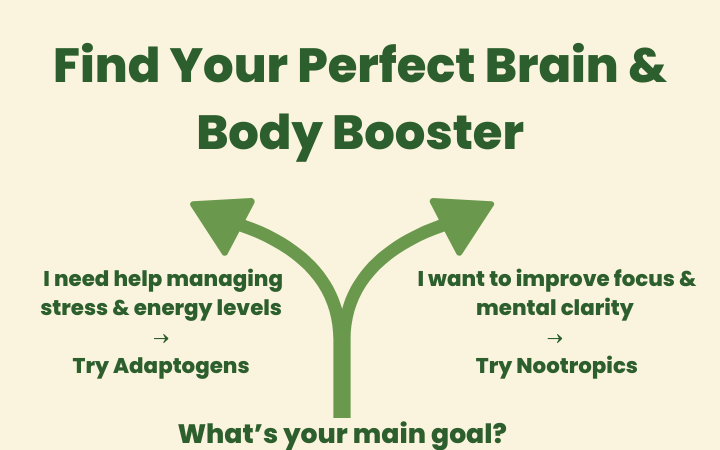Physical Address
304 North Cardinal St.
Dorchester Center, MA 02124
Physical Address
304 North Cardinal St.
Dorchester Center, MA 02124

Adaptogens help your body handle stress. Nootropics support brain function. Simple enough, right?
Well, not always—especially when some ingredients claim to do both.
If you’ve ever wondered whether you need a stress-relieving adaptogen, a brain-boosting nootropic, or something in between, you’re in the right place.
We’ll break it all down in a way that actually makes sense—so you can pick what works for you.
Think of adaptogens as your body’s personal stress managers. These natural substances—usually herbs and mushrooms—help your body handle stress better and find its balance again when things get chaotic.
To be called an adaptogen, a plant needs to check three boxes:
Some popular adaptogens include:
The chill champion. This root has been used for centuries to help lower anxiety and stress. Many people find it helps them sleep better too.
The fatigue fighter. When you’re feeling burnt out, Rhodiola might give you a second wind. It’s particularly good at helping your body bounce back from physical and mental exhaustion.
The mood booster. This isn’t the same basil you put on pizza! Holy Basil has been used in Ayurvedic medicine for thousands of years to promote calmness and clear thinking.
The energy balancer. Feeling wiped out? Ginseng might help restore your energy without the jittery feeling coffee gives you.
The relaxation fungi. This mushroom is known for its calming effects and may help you get better sleep. It’s perfect for when your mind just won’t shut off at night.
Now let’s talk about nootropics—your brain’s best friends. While adaptogens focus on stress, nootropics target brain function specifically.
Nootropics are substances that may boost your cognitive abilities—things like memory, focus, creativity, and learning. They’re essentially brain food.
The term “nootropic” came from a Romanian scientist in 1972 who created criteria for what makes something a true nootropic. But these days, people use the term more broadly for anything that might give your brain a boost.
Nootropics come in two main types:
These come from plants and other natural sources:
This fuzzy mushroom (that thankfully doesn’t taste like mushrooms) may help your brain create new neural connections.
This dynamic duo is why green tea gives you alert energy without the crash. Caffeine wakes you up, while L-theanine (found naturally in tea) keeps you calm and focused.
This herb might help you remember things better. Students cramming for exams have used it for centuries.
This ancient tree’s leaves may improve blood flow to your brain, potentially helping with memory and focus.
These are manufactured compounds:
One of the original “smart drugs,” it might improve memory and learning.
A prescription medication used for sleep disorders that some people use off-label for increased alertness and focus.
So what’s the real difference between these two categories? Let’s break it down:

Adaptogens: Helps your body handle stress and stay balanced overall
Nootropics: These target brain function specifically to improve thinking, memory, and focus
Adaptogens: Work with your entire body’s stress response system
Nootropics: Zero in on brain performance and cognitive abilities
Adaptogens: When life feels overwhelming and you need help managing stress
Nootropics: When you need mental clarity, focus, or memory support
Here’s where it gets interesting—some plants have super powers that put them in both categories!
For example, Rhodiola Rosea is primarily an adaptogen (it helps with stress), but it also has nootropic effects (it can improve mental performance).
Lion’s Mane is often considered primarily a nootropic for its brain-boosting effects, but it may have some adaptogenic properties too.
Ashwagandha is mainly known as an adaptogen, but research suggests it might have cognitive benefits that could put it in the nootropic category as well.
Before you start tossing handfuls of supplements into your mouth, let’s talk safety.
Both adaptogens and nootropics are generally considered safe for most people, but they’re not without risks:
The quality of your supplements matters a ton. The supplement industry isn’t tightly regulated, so finding reputable brands is super important.
Also, more isn’t always better! Start with small doses to see how your body responds.
Ready to give these brain and body boosters a try? Here’s how to start:
Are you trying to manage stress? Go with adaptogens.
Need help staying focused? Look at nootropics.
Both? You might want to try something that crosses categories.
Begin with the smallest recommended dose and see how you feel before increasing.
Many of these plants work best when taken regularly over time. Don’t expect overnight miracles!
Keep notes on how you feel—changes can be subtle at first.

Here’s the truth: neither adaptogens nor nootropics are magic pills. They won’t fix your life overnight or turn you into a stress-free genius.
What they can do is support your body and brain as part of a healthy lifestyle. Think of them as helpful tools, not miracle solutions.
Some people notice effects from adaptogens or nootropics right away, while others might need a few weeks of consistent use.
And like anything else, what works amazingly for your friend might do nothing for you.
Yes! Many people combine them to support both stress management and cognitive function. Just be mindful of how they interact—some combinations might amplify effects, while others could counteract each other. Start with small doses and track how you feel.
It depends on the supplement. Some nootropics, like caffeine or L-theanine, can have immediate effects, while others, like Bacopa Monnieri or Lion’s Mane, may take weeks of consistent use. Adaptogens often require regular use for a few weeks before you notice changes in stress levels or energy.
Most natural adaptogens and nootropics don’t cause withdrawal symptoms, but synthetic nootropics like Modafinil or certain racetams might. If you stop taking them suddenly, you could experience fatigue or mental fog, depending on the substance.
For most people, yes—but it depends on the specific adaptogen or nootropic. Some, like Ashwagandha or Lion’s Mane, are safe for daily use, while others, like Rhodiola, might work best in cycles to prevent your body from adapting too much to their effects. Always follow dosage guidelines.
Absolutely. Adaptogens and nootropics can help, but they won’t replace sleep, a balanced diet, exercise, and stress management. Think of them as tools—not magic fixes. A strong foundation of good habits will always be your best bet for overall well-being.
Adaptogens and nootropics each have a unique role in supporting your body and mind. Adaptogens help you stay steady when life throws stress your way, while nootropics sharpen your focus and memory.
Some ingredients, like Rhodiola and Lion’s Mane, blur the lines and offer benefits from both categories.
The key is to start small, stay consistent, and pay attention to what actually works for you.
Curious about which adaptogens and nootropics match your goals? Sign up for our newsletter for practical breakdowns, smart recommendations, and the latest research—delivered straight to your inbox.